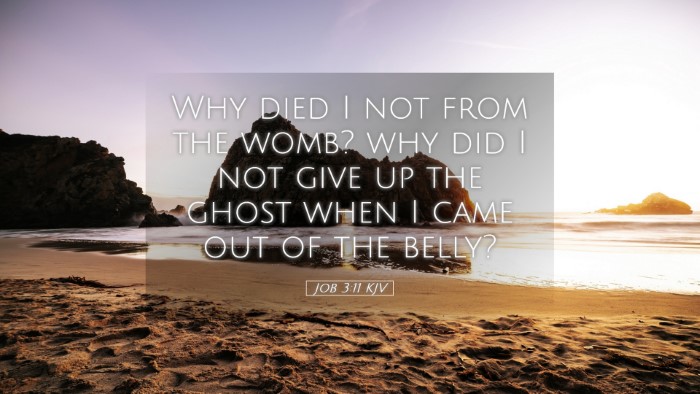Old Testament
Genesis Exodus Leviticus Numbers Deuteronomy Joshua Judges Ruth 1 Samuel 2 Samuel 1 Kings 2 Kings 1 Chronicles 2 Chronicles Ezra Nehemiah Esther Job Psalms Proverbs Ecclesiastes Song of Solomon Isaiah Jeremiah Lamentations Ezekiel Daniel Hosea Joel Amos Obadiah Jonah Micah Nahum Habakkuk Zephaniah Haggai Zechariah MalachiJob 3:11
Job 3:11 KJV
Why died I not from the womb? why did I not give up the ghost when I came out of the belly?
Job 3:11 Bible Commentary
Commentary on Job 3:11
Job 3:11: "Why died I not at birth, and died I not when I came out of the womb?"
Introduction
The Book of Job is a profound exploration of suffering, loss, and the questioning of divine justice. In Job 3:11, we encounter a poignant expression of despair from Job, reflecting on the profound depths of his anguish. This utterance opens a window into Job's soul as he grapples with the meaning of existence amid his unimaginable suffering.
Contextual Background
After experiencing devastating losses, including the death of his children and the loss of his wealth, Job is left in a state of deep sorrow. Chapter 3 marks the beginning of Job's lament, where he curses the day of his birth. It is significant to understand this cry not just as a moment of weakness, but as part of Job's profound inquiry into the nature of suffering and God's justice.
Exegesis of the Verse
- Job's Lamentation: In this verse, Job expresses a wish that he had never been born. This sentiment resonates deeply with human suffering and reflects an innate desire for release from pain.
- Existential Reflection: Job's question is not merely rhetorical; it signals a deep existential crisis. His situation prompts serious theological questions about the purpose of life and the nature of God's involvement in human suffering.
- The Role of Birth and Death: Job's lament underscores the relationship between birth and death. By wishing for death at birth, he challenges the notion that life is inherently meaningful, especially when faced with unbearable grief.
Theological Insights
- The Problem of Suffering: Job's unfiltered expression of despair highlights the age-old question of why the righteous suffer while the wicked prosper. This tension is central to the book of Job.
- God's Sovereignty: Despite Job's anguish, the underlying theme remains that God is sovereign over life and death. Job's questioning serves to ultimately reaffirm God's authority and the mystery of divine providence.
- Hope Amid Despair: Job’s laments also reflect an innate human hope for relief. His desire to escape despair by questioning life itself shows a longing for understanding that spurs deeper reflection on God’s plans.
Commentary Insights
- Matthew Henry: Henry emphasizes Job's wish to have never lived as an expression of the excruciating pain experienced in his trials. He suggests that this deep sorrow is a common human experience in the face of overwhelming grief.
- Albert Barnes: Barnes comments on the implications of Job’s words regarding the meaning of life and death. He points out that Job's lament reveals a natural inclination to ponder the existential questions of one’s existence.
- Adam Clarke: Clarke observes Job's lament as a profound moment of vulnerability, where Job reaches an emotional tipping point. He highlights how Job's wish echoes the themes of mortality and the human condition.
Application for Today’s Believers
This verse invites both pastors and scholars to reflect upon the nature of suffering in the lives of believers. Job's cry contemplates the depths of despair, yet it also provides a framework for understanding our struggles in faith.
- Empathy for the Suffering: The church must cultivate empathy for those who suffer and allow space for lament, recognizing that doubting and questioning are part of the faith journey.
- The Necessity of Lament: Believers should embrace the practice of lamentation as a powerful means to process grief and connect with God amidst suffering.
- Reaffirming Hope: Ultimately, pastors and theologians should guide others in reaffirming hope, helping them to see that suffering is not without purpose, and that through our struggles, we may draw closer to God.
Conclusion
Job 3:11 stands as a profound testament to the complexity of human suffering and the struggle with faith. As we engage with Job’s lament, we are reminded of the raw honesty needed in our dialogues with God, and the importance of understanding the broader questions of life and existence that suffering raises. Through commentaries like those of Henry, Barnes, and Clarke, we find a rich tapestry of insights that deepen our reflection on this poignant verse, encouraging us to navigate the turbulent waters of suffering with faith and hope.


